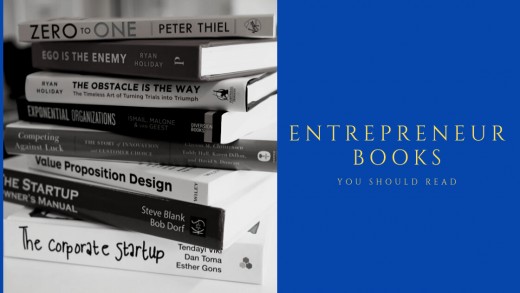Books from Rohit Manglik’s Reading List to Invest in Before Your Startup Takes Off

Running a startup is a task of constant reinvention and relearning. And usually, a startup founder puts in all his sweat and blood into giving his dream a successful flight. But how about investing in books? Won't it be fruitful to go through the records of those who have already tasted the fruits which you are about to bear?
Many successful players of the business community have put pen to paper to allow their successors to peek into the splendid yet horrific corporate world. There are volumes of printed material that showcase the successes and failures of some of the biggest sharks of the entrepreneurial sea. They represent a lifetime of entrepreneurs, the ideas they perceived, the shots they missed, and the opportunities they grabbed.
Here is an inside scoop of some incredible and inspirational publications from Rohit Manglik’s reading list that will feed you the wisdom you need to drive your startup to success.
Innovation Books
Zero to One – Notes on Startups, or How to Build the Future
Peter Thiel’s book holds some satiating morsels of wisdom, innovation, and businesses. It follows the belief that you step into a river only once. Likewise, every moment in business happens just once. The act of creation, as well as the moment of creation, is singular. The next Mark Zuckerberg won’t create another Facebook and the next Steve Jobs won’t create another Apple.
When one copies a model, he just adds an nth layer to it. However, creating something new takes the world from 0 to 1 and results in something strange and fresh. And that is the most important strength of every business – innovation. And innovation is found in unexpected places. There is no concrete formula for it.
Recommended by entrepreneurs like Elon Musk, the book offers some pertinent insights into the business world and forces the readers to think and ignite possibilities.
Founders at Work – Stories of Startups’ Early Days
Founders at Work is basically a collection of fascinating interviews by Jessica Livingston, enticing enough to knock the doors of every entrepreneur’s heart. The book records the anecdotes of a diversity of entrepreneurs, right from veterans like Steve Wozniak to the recent ones like Ev Williams.
The 33 chapters recite the tribulations, strategies, downfalls, and upsurges of game runners at Google, Microsoft, WhatsApp, and other billion-dollar companies. It is an account of the hurdles and challenges they faced as a startup and how incredibly they conquered them. It is quite relieving to read that the tech giants too made mistakes, witnessed highs and lows, and even reached the ‘give it up all’ stage.
Founders at work is a foreword of the extraordinary perseverance of some successful entrepreneurs and their strategies to hold things back and sail through the uncertain times. it is good for a book nerd and ideal for a budding enterpriser – Rohit Manglik
Product Management Books
Hooked – How to Build Habit-forming Products
Nir Eyal’s write-up is a must-read for every startup founder, marketer, and product design manager. The book is a result of the years Eyal spent in research, consulting, and practical experience. It is the answer to all those questions that a startup founder looks for and an encyclopedia on building better and influential products.
The contents of Hooked will tell you why some products skyrocket while others are a complete failure, what makes products attractive and what drowns them, and what are the underlying patterns that hook people to products and technologies. Taking a cue from habit-forming products like Twitter, Pinterest, and iPhone, Nir has shared some actionable steps for building lovable products.
The Lean Startup – How Today’s Entrepreneurs use Continuous Innovation to Create Radically Successful Businesses
The effective and innovative ideas of Eric Ries are a must-read for every budding entrepreneur who wants to make it big into the business world. The Lean Startup is not just about creating a successful business venture but also about doing all the big things and being less wasteful. Eric's approach to using human creativity to its highest potential and his ideas on making an enterprise flexible and agile are the hallmarks of this book.
Eric suggests that rather than formulating elaborate business plans, startup founders should treat their venture as an experiment and test their vision continuously. This would probably organize the development of their product in a better way. Product management cannot be taught, it has to be learned.
The book challenges the vision that success is a consequence of some big great idea and asserts that it can only be engineered by following the right processes.
The book is hard-won advice for all leaders to bring out the best in their employees – Rohit Manglik
Growth Hacking Books
The Checklist Manifesto – How to Get Things Right
The Checklist Manifesto is a surgeon’s perception of failures in the human world and the underlying cause of it. Written by Atul Gawande, the book claims that the knowledge we possess is vast and complex enough to be delivered safely, reliably, and correctly. And it is this ‘ineptitude' is what leads us to skip steps while doing different things.
Be it grocery shopping or evaluating a patient, if you miss a single detail you could land yourself into an insidious problem. And the simplest way to avoid it, as suggested by Atul, is a ‘Checklist’. The author narrates how a basic checklist can save us from major and minor pitfalls of day-to-day life and organize our work.
Traction – How Any Startup Can Achieve Explosive Customer Growth
Gabriel Weinberg and Justin Mares' Traction is a nuts-and-bolts guide for startup businesses to expand their consumer-base and get traction. The authors argue that ‘traction’ or the prowess to consistently acquire new customers is what draws the line between successful startups and the aborted ones.
The book defines the common framework that entrepreneurs followed to give the world some of the biggest organizations, one that Jimmy Wales used to create Wikipedia and Alexis Ohanian for Reddit. It then explores 19 marketing channels that can lend an entrepreneur some traction for his business.
The tactics, lessons, and examples listed in the book are quite practical and powerful enough to get a grip on your business.
The book offers a four-step framework of creating habits for users and along with it a potential startup – Rohit Manglik
Fund Management Books
Mastering the VC Game – A Venture Capital Insider Reveals How to Get from Startup to IPO on Your Terms
Mastering the VC Game is Jeffrey Bussgang’s guide for every entrepreneur who wants to explore the backdrop of Venture Capital. Jeffrey has played both sides of the VC game and has shared some great stories about Venture Capitalists – the economic hawks.
The book explores the complex relationship between startup founders and VCs and offers some great insights into the mysterious world of ‘funding’. Jeffrey has penned down some exceptional pieces of advice by the successful players of this game as well as his own experiences in the book.
Raising Capital – Get the Money You Need to Grow your Business
Andrew J. Sherman’s book is a business manual for raising funds, the necessary precursor for the growth of every business. The journal covers the fundamentals of seed capital, early-stage funding, growth funding, and alternatives to traditional funding.
The scope of the book covers all the possible capital sources that an entrepreneur can tap, guidelines for preparing the perfect pitch, the issues that arise in deal negotiation, and financial vehicles like bonds, commercial papers, along with a multitude of real business solutions.
Raising Capital shares some pertinent checklists for raising capital in the different phases of the growth cycle.
The inspirational stories, analogies, and thought-provoking incidents shared by the author appeal to every profession and offer some beautifully written vignettes – Rohit Manglik
Epilogue
Being a startup founder is as hard as fathering a 3-year old kid. The business world is not accommodating enough to let one make mistakes and learn. Hence, the better idea is to learn from the missteps and failures of others. In such a case, these books are a perfect idea to master the business cycle. The insights you will receive from these manuals will pay off in the later future.









